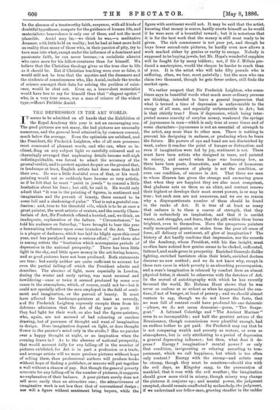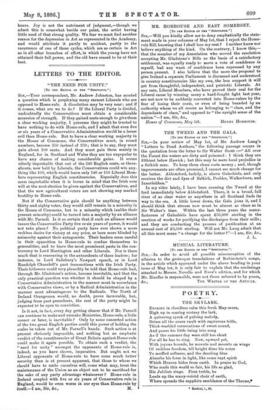THE DEPRESSION IN THE ART WORLD.
IT seems to be admitted on all hands that the Exhibition of the Royal Academy this year is not an encouraging one. The good pictures are not many, the bad pictures are unusually numerous, and the general level attained is, by common consent, much below the average. Even the optimists are subdued, and the President, Sir Frederick Leighton, who of all men possesses most command of pleasant words, and who can, when so in- clined, fling on any subject light so carefully coloured and so 'charmingly arranged that unpleasing details become well-nigh indistinguishable, was forced to admit the accuracy of the general verdict, and to protest against despair on the gronnd that., in landscape at least, English artiste had done more than hold their own. He was a little doubtful even of that, or his word. painting would not so suddenly have become so very artistic, as if he felt that he must "paint in jewels" to conceal a little hesitation about his lines ; but still, he said it. He would only admit that "it was in the painting of figures, in sentiment and -imagination and the pursuit of beauty, there seemed to be _some lull and a slackening of pulse." That is not a grateful con- fession ; and, true to his threefold role, which is to be at once a great painter, the most artistic of orators, and the courtly Cham- berlain of Art, Sir Frederick offered a hurried, and, we think, an inadequate, explanation of the failure. "Circumstances," he told his audience on Saturday, "have brought to bear this year a benumbing influence upon some branches of the Art. There is a plague of darkness, which has laid its blight upon this cruel year, and has paralysed many a serious effort ;" and there also is among artists the "hesitation which accompanies periods of depression in the national prosperity." There has been little light in the sky, and little spare money in the art-loving houses, and so good pictures have not been produced. Both statements are true ; but surely neither are quite sufficient to account for even the partial falling-off which the President admits and describes. The absence of light, more especially in London, during the winter and early spring, was most unusual and bewildering—once or twice it seemed produced by some new cause in the atmosphere, which, of course, could not be—but it eoald not specially affect the men employed in the field of senti- ment and imagination, or the pursuit of beauty. It must have affected the landscape-painters at least as severely, a.ad Sir Frederick Leightoa expressly excepts them from his dolorous admission that the Art of the year is poor. If they had light for their work, so also had the figure-painters, who, again, are not accused of bad colouring or careless drawing, but of poorness of thought and want of imagination in design. Does imagination depend on light, or does thought dower in the painter's mind only in the studio ? Has no painter ever a happy thought at night, or an inspiration when the evening draws in ? As to the absence of national prosperity, that would account fully for any falling-off in the number of pictures exhibited, for Art is in part a profession or a trade, and average artists will no more produce pictures without hope of selling them, than professional authors will produce books without hope of finding a publisher, or masons will put together a wall without a chance of pay. But though the general poverty accounts for any falling-off in the number of pictures, it suggests ao explanation of their badness. A poor picture surely does not -sell more easily than an attractive one ; the attractiveness of imaginative work is not less than that of conventional design ; nor will a figure without sentiment bring buyers, while the figure with sentiment would not. It may be said that the artist, knowing that money is scarce, hardly exerts himself as be would if he were sure of a bountiful reward ; but it is notorious that it is for the best work that the money is still most ready to be given. The rich connoisseur is not poor yet, and though he buys fewer second-rate pictures, he hardly even now allows a work marked either by genius or rarity to escape. Nobody is supposed to be buying jewels, but Mr. Hope's wonderful sapphire will be fought for by many bidders ; nor, if Sir J. Millais pro- daced a masterpiece, would the cheque be harder to reach than of yore. It is the artist who will take fifty pounds who is suffering, often, we fear, most painfully ; but the man who can claim two thousand, though he gets fewer orders, still finds the market open.
We rather suspect that Sir Frederick Leighton, who some- times says in beautiful words what much more ordinary persons are thinking, intended to leave a general impression that what is termed a time of depression is unfavourable to the energy of all men, and especially unfavourable to Art ; but is that strictly true ? Even if depression, which being inter- preted means scarcity of surplus money, weakened the springs of joyousness in men—which is only true at some times and of some characters—joyousness is not an essential of strength to the artist, any more than to other men. There is nothing to prevent his designing in sadness, or producing when he fears the future. His powers of eye and hand are not diminished by want, unless it reaches the point of hunger or distraction, and even if imagination were fed by joy, sentiment is not. There must have been artists who designed in tears, and painted in misery, and carved when hope was burning low, as there have been poets, dramatists, and authors of humorous fiction. The presence of plenty is not the condition, or even one condition, of success in Art. That there are men to whom Heaven has given the strange and ensnaring grace that when they are happiest they are also most competent, that gladness acts on them as an elixir, and content renews their highest or develops their most secret powers, is or may be true ; but such men are not numerous, and we see no reason why a disproportionate number of them should be found in the ranks of Art. It is true of at least as many that sadness is to them a source of strength, that they fiud in melancholy an inspiration, and that it is amidst wants, and struggles, and fears, that the gift within them burns brightest, even to themselves. Have the prosperous painters really monopolised genius, or stolen from the poor all sense of form, all delicacy of sentiment, all glow of imagination P The history of Art hardly confirms that impression, nor the records of the Academy, whose President, with his fine insight, must so often have noticed how genius seems to be choked, suffocated, fattened, and made gross in prosperity. Enriched Generals dislike fighting, enriched barristers skim their briefs, enriched doctors discover no new method ; and we do not know why, except in those rare cases in which poverty is an absorbing preoccupation, and a man's imagination is released by comfort from an almost physical fetter, it should be otherwise with the devotees of Art. In the morsel of autobiography with which be has recently favoured the world, Mr. Holman Hunt shows that he was never so zealous or so ardent as when he approached the con- fines, if not of hunger, at least of penury ; and we should almost venture to say, though we do not know the facts, that no man full of content could have produced his one daimonic —please, we do not mean demoniac—poem, "The Scape- goat." A fattened Coleridge and "The Ancient Mariner" seem to us incompatible ; and half the greatest artists of the Renaissance, though commissions were plentiful enough, had an endless bother to get paid. Sir Frederick may say that he is not comparing wealth and poverty as motors, or even as atmospheres, but is only attributing to a period of depression a general depressing influence; but then, what does it de- press ? Energy ? imagination ? mental power ? or only that condition, invigorating or relaxing according to tem- perament, which we call happiness, but which is too often only content ? Energy with the strong—and artists may be strong, though they must be sensitive—should rise with the evil days, as Kingsley sang, to the provocation of mankind, that it rose with the evil weather ; the imagination should grow more vivid in misery, though misery may change the pictures it conjures up ; and mental power, the judgment excepted, should remain unaffected by melancholy, the judgment, if we understand our fellow-men, growing steadier in the sadder
hours. Joy is not the nutriment of judgment,—though we admit this is somewhat beside our point, the artist having little need of that strong quality. We fear we must find another reason for the depression in Art as represented in the Academy, and would attribute it partly to accident, partly to the recurrence of one of those cycles, which are as certain in Art as in all other branches of effort, in which the young have not -attained their fall power, and the old have ceased to be at their best.















































 Previous page
Previous page